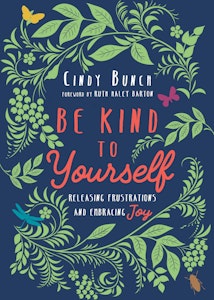 Excerpt from Be Kind to Yourself
Excerpt from Be Kind to Yourself
Two Simple Questions
“Notice when you are bugged.” That statement stopped me short as I was reading. The things that bug me can form a low hum in my brain throughout a day. They can spoil — or threaten to spoil — the other lovely moments of the day.
I found these words in the manuscript for Gem and Alan Fadling’s book What Does Your Soul Love? in a section where they were describing how we place ourselves in a state of openness before God. In my work as an editor, I get to read wonderful books and interact with some very wise souls. When I am reading in manuscript form, I am often in professional mode, thinking of the structure of the book, how the audience will receive it, and so on. But sometimes a line or section jumps out to me. Then I know those words are for me. It is God offering me a nudge in the midst of the workday.
I took that statement and made it into a question. Then I decided to make it a part of a daily practice. I would think about the past day and write down the answer to just two questions:
- What’s bugging you?
- What’s bringing you joy?
Creating that simple practice has been a great help to me. As I lean into it, I see where I am hooked into negative thought patterns about myself or others, and what I need to let go of. I also see what brings me joy. And each day brings a new opportunity to lean into that as well. The more I understand about what’s bugging me and free myself of that, the more I am able to embrace opportunities for joy. It’s part of what I am learning about being kind to myself.
The ways that we talk to ourselves about the things that are bugging us are a part of a practice of self-kindness. What do I say to myself when what’s bugging me is that I escalated a small matter into a situation where I yelled at my husband? How do I process those moments when I am passed over at work? Or when a friend makes a hurtful comment? Or even something as mundane as getting stuck in an hour-long customer service call with no satisfaction?
As we learn new ways of dealing with the moments of difficulty in each day, we make space for the moments of joy to take greater hold of us.
Self-Kindness Leads to Empathy Toward Others
Scripture tells us to “love your neighbor as yourself” (Mark 12:31). And we may have even heard it noted in a sermon that we should not neglect ourselves as we care for others. But often that is simply said in passing as we focus on being of service to the world. Giving our attention to what it means to love ourselves may feel selfish. And yet even Jesus took time away from the crowds he was teaching to pray (Luke 5:16).
Another benefit of this increased self-kindness is that when we are tender with ourselves, we cultivate a greater tenderness and empathy toward others. It is a fruit of goodness to ourselves that we increase in goodness toward our neighbor. Anne Lamott describes how she learned from others who were getting sober that “extending ourselves to others would help us stay sober and sane.” The pattern of getting a sponsor in AA follows this principle. But then Lamott continues: “They also wanted us to extend ourselves to our own horrible selves, at our most ruined, to speak gently to ourselves, get ourselves a lovely cup of tea.” For many of us, offering grace to ourselves is harder than extending grace to others.
Over time I have discovered practices that have helped me to identify and work with the daily pain I carry and also to embrace the things that bring me awareness of God’s very good gifts. These practices are recorded here in hopes that they will assist others in the journey into deepening joy — not to be a guilt-inducing catalog of things to do. Read and practice at your own pace. Pick up the practices that you are drawn to and let the others go in keeping with Jesus’ offer of “unforced rhythms of grace” (Matthew 11:29 The Message).
A New Way to Review Each Day
I have long struggled with the traditional understanding of how to practice examen, a pattern of prayer that comes from Saint Ignatius, the sixteenth-century mystic and founder of the Jesuits. The basic idea is to take a bit of time in the evening to sit and mentally review the day — play it through like a movie. As you do so, notice where you felt close to God (moments of consolation), and notice where you felt far from God (moments of desolation). To me, it always felt like another way to feel badly about myself — a way to review and recall all of my sin for the day. While I know it’s good to remember my sin so that I can confess it to God, the review would throw me into a place of shame. Further, doing it at night reminded me of all the things I could be worrying over just as I was trying to go to sleep. For me, it was not a good combination.
Using these two simple daily review questions took the edge off the pain and made the practice more accessible to me. A further tweak for me was to review the previous day in the morning. I was already in a morning routine of spiritual reading and journaling, so it fit right in with that. I spend a few moments thinking about the day that has passed. Then I write in my journal the answers to the two questions numbered with a 1 and a 2.
Tackling the examen from the approach of what’s bugging me and what’s making me happy keeps me out of the sinkhole of shame. The things that bug me are — of course — not completely outside myself. The truth is that things that bug me the most are often the personal encounters that go wrong. Or they may be things that are causing me worry or anxiety, running a never-ending mental loop. My part in it is my own response — whether simply internal or expressed.
These questions have made me more aware of the things I hold on to each day. The things that pull me down. The things that keep me from noticing that God is near and is constantly drawing me in.
Related Podcast
Taken from Be Kind to Yourself by Cindy Bunch. Copyright © 2020 by Cindy Bunch. Published by InterVarsity Press, Downers Grove, IL. www.ivpress.com
Text First Published July 2020


